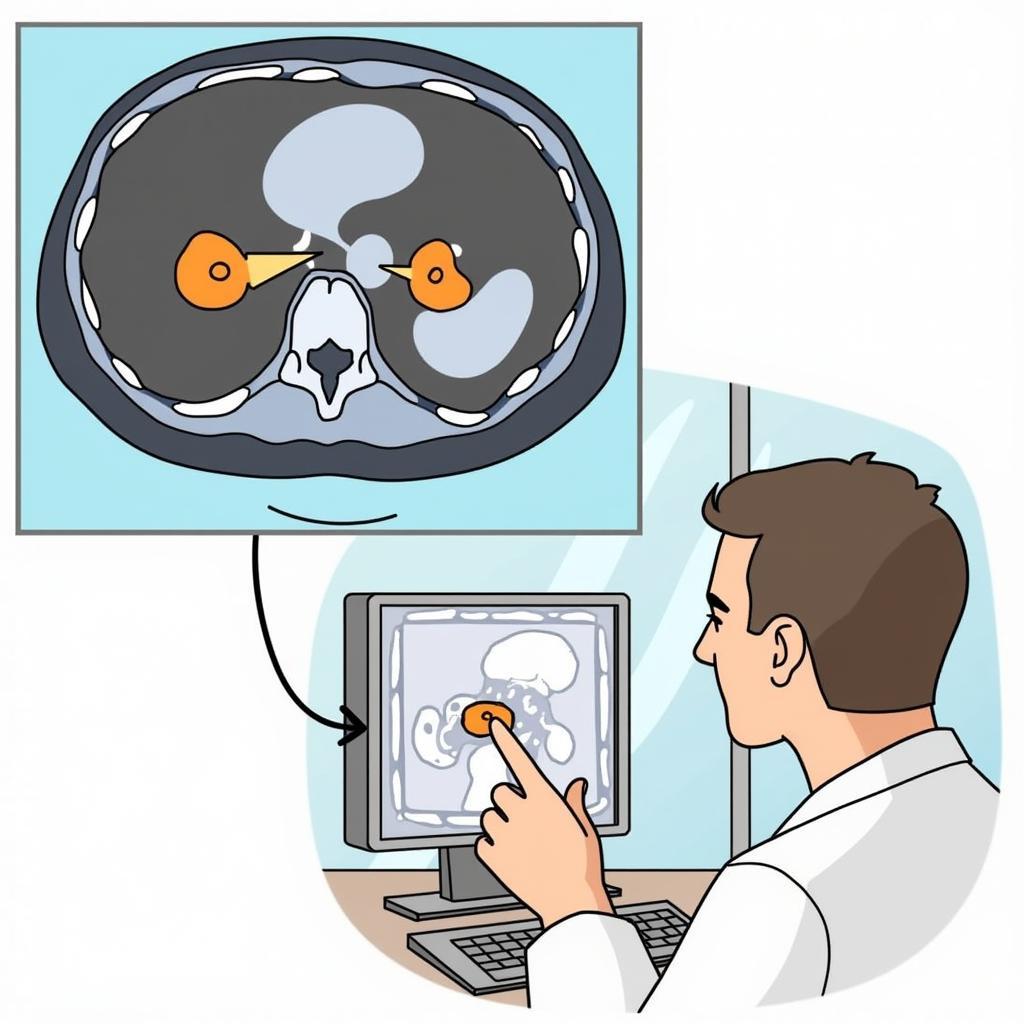An adrenal incidentaloma, as defined by the Endocrine Society, is an adrenal mass discovered incidentally during imaging performed for reasons unrelated to adrenal disease. This unexpected finding often raises concerns and requires careful evaluation.
What is an Adrenal Incidentaloma?
An adrenal incidentaloma is typically a small, non-cancerous growth on the adrenal gland, a small organ located above each kidney. These growths are often benign and discovered unexpectedly during CT scans, MRI scans, or other imaging tests conducted for unrelated conditions. While often harmless, it’s crucial to determine the nature of the incidentaloma with the guidance of the Endocrine Society’s clinical practice guidelines.
 Adrenal Incidentaloma Diagnosis
Adrenal Incidentaloma Diagnosis
Evaluating an Adrenal Incidentaloma: The Endocrine Society’s Recommendations
The Endocrine Society provides comprehensive guidelines for evaluating adrenal incidentalomas. These guidelines help healthcare professionals determine whether the incidentaloma is functioning (producing hormones) or non-functioning. The evaluation process typically involves:
- Biochemical testing: Blood and urine tests to assess hormone levels, particularly cortisol (for Cushing’s syndrome), aldosterone (for primary aldosteronism), and catecholamines (for pheochromocytoma).
- Imaging studies: Further imaging, such as a dedicated adrenal CT or MRI, may be needed to better characterize the incidentaloma.
- Follow-up imaging: For small, non-functioning incidentalomas, repeat imaging may be recommended to monitor for growth or changes.
Adrenal Incidentaloma: Functioning vs. Non-Functioning
It is essential to distinguish between functioning and non-functioning adrenal incidentalomas. Functioning incidentalomas secrete hormones that can cause various health issues. For instance, an incidentaloma causing Cushing’s syndrome can lead to weight gain, high blood pressure, and diabetes. In contrast, non-functioning incidentalomas are usually asymptomatic and do not require immediate intervention.
 Functioning vs. Non-Functioning Adrenal Incidentaloma
Functioning vs. Non-Functioning Adrenal Incidentaloma
When is Surgery Necessary for an Adrenal Incidentaloma?
Surgery is typically recommended for functioning adrenal incidentalomas and for non-functioning incidentalomas that are large or show suspicious features on imaging, such as rapid growth or irregular borders. The Endocrine Society guidelines provide specific criteria for surgical intervention. Dr. Maria Sanchez, endocrinologist at the University of California, San Francisco, advises, “While most incidentalomas are benign, it’s crucial to carefully evaluate them following established guidelines to ensure appropriate management.”
Living with an Adrenal Incidentaloma
Most individuals with non-functioning adrenal incidentalomas can live normal, healthy lives with regular monitoring. Dr. David Brown, a leading expert in adrenal disorders at Mayo Clinic, adds, “Regular follow-up with an endocrinologist is key for patients with adrenal incidentalomas to ensure any changes are detected and addressed promptly.”
Conclusion
Understanding the Endocrine Society’s approach to adrenal incidentalomas is crucial for both patients and healthcare professionals. Early detection and proper evaluation, guided by the Endocrine Society’s recommendations, are vital for appropriate management and optimal patient outcomes. Adrenal incidentalomas, while often benign, require a thorough workup to ensure no underlying hormonal imbalance exists.
FAQ
- What is the most common type of adrenal incidentaloma?
- What are the symptoms of a functioning adrenal incidentaloma?
- How often should I have follow-up imaging for a non-functioning incidentaloma?
- What are the risks of adrenal surgery?
- Can an adrenal incidentaloma become cancerous?
- What is the role of an endocrinologist in managing adrenal incidentalomas?
- Are there any lifestyle changes recommended for individuals with adrenal incidentalomas?
Need further assistance? You can contact us at Phone Number: 02043854663, Email: [email protected] or visit our address: Khu 34, Bac Giang, 260000, Vietnam. We have a 24/7 customer service team.